Christina Reese – Trauma-Informed Compassionate Classrooms: Strategies to Reduce Challenging Behavior, Improve Learning Outcomes and Increase Student Engagement
$219.99 $43.00
Instant Download: You will receive a download link via your order email immediately
Should you have any questions, please contact us: [email protected]
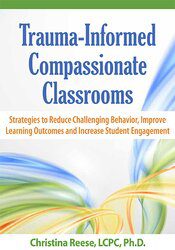 Christina Reese – Trauma-Informed Compassionate Classrooms: Strategies to Reduce Challenging Behavior, Improve Learning Outcomes and Increase Student Engagement
Christina Reese – Trauma-Informed Compassionate Classrooms: Strategies to Reduce Challenging Behavior, Improve Learning Outcomes and Increase Student Engagement
- Faculty:
- Christina Reese
- Duration:
- 6 Hours 20 Minutes
- Format:
- Audio and Video
- Copyright:
- Apr 28, 2020
Description
As an educator, you are faced with the challenge of meeting the social and emotional needs of all your students. This can be challenging enough with typical learners but it is even more difficult with those who have experienced trauma or have mental health challenges. Students who have experienced trauma often present as difficult to engage and display problematic behavior such as a low frustration tolerance, angry outbursts, or difficult social relationships. These behaviors all get in the way of teaching and learning. When a student has experienced trauma, he/she often spends much of the day in fight/flight/freeze mode which limits their capacity to learn. Their outwardly aggressive and irritable behaviors also disrupt the flow in the classroom, requiring your time and attention. Despite the amount of time you invest in behavior charts or incentives for good behavior, traditional behavioral approaches to classroom management and a punitive approach to discipline simply are not effective.
Join Dr. Reese in the recording and learn how a trauma-informed approach will greatly reduce challenging behavior, improve student engagement and increase learning outcomes. Finish this program with new strategies, tools, and resources to reduce students’ impulsiveness, aggressive behaviors, and inattention and increase their focus, attention, and compassion. While this positive approach is absolutely essential for students with trauma, it will also greatly benefit each and every student in your classroom. Return to your school with:
- Research-based practices to establish a trauma-informed classroom
- A plan to develop positive relationships and build trust with your hard-to-reach students
- Prove techniques for communicating more effectively and collaboratively with challenging students
- Cognitive skill-building strategies which incorporate the science of neuroplasticity and the strengths-based perspective of neurodiversity
Handouts
Outline
Trauma in Students: What to Look For
- Fight, flight, or freeze responses: How it manifests in school
- Wired for fear: Impact on the whole child
- ACES – Adverse Childhood Experiences study and survey
- The role of poverty and mental health challenges
Trauma Therapy
- Benefits
- Limitations of the Research
- Potential Risks
Discipline in a Trauma-Informed Classroom
- Changing your mindset: Punitive vs. collaborative
- Strategies to foster intrinsic motivation
- 3 steps to implement a collaborative approach
- Case study: How you respond
Neuroplasticity: Activities to Establish & Strengthen Neural Pathways
- Strategies to develop new ways of responding
- Slow down, stop, and think
- Respond rather than react
- Social stories
- Techniques to incorporate the 4 R’s:
- Rhythmic
- Repetitive
- Relational
- Rewarding
Relationships as a Protective Factor
- Techniques to form positive relationships and increase students’ likeliness to:
- Stay in school longer
- Work harder
- Increase test scores & grades
- Increase their self-confidence
- Techniques to help students feel connected to school making them less likely to:
- Smoke or drink
- Have sexual intercourse
- Develop emotional problems
- Experience suicidal thoughts or attempts
- Carry weapons
- Be involved in violence or dangerous activities
- Case study: Strengths-based, solution focused approach
Mindfulness and Self-Awareness Activities to:
- Help with transitions
- Reduce impulsive behaviors
- Strengthen empathy, kindness, and compassion
- Calm and focus attention
Social and Emotional Learning Techniques to Increase:
- Focus and concentration
- Impulse control
- Conflict resolution skills
Mindful Communication Tools to Improve Student Engagement
- Lead with presence
- Attention
- Intention
Mindful Strategies to Increase Connection, Empathy, & Community
- Gratitude
- Heartfulness
Zones of Regulation to Teach Self-Awareness & Emotional Control
- Red zone
- Yellow zone
- Green zone
- Blue zone
Faculty
Christina Reese, LCPC, Ph.D., has been working with children impacted by trauma for over 15 years, and has recently completed training as a TBRI Practitioner. She helps children and their families impacted by a variety of traumas, providing both in home and in school therapy to these children. Over this time, Dr. Reese has partnered with schools in Baltimore County and Baltimore City to help teachers find interventions that get results in the classroom. A passionate advocate for children and their families, she has worked with children in court ordered drug treatment at the Anne Arundel County Circuit Court, as well as in residential treatment centers and in the community.
Dr. Reese, a recognized attachment and trauma professional, has created a comprehensive guide that explains attachment over a lifetime. Her book, Attachment: 60 Trauma-Informed Assessment and Treatment Interventions Across the Lifespan (PESI, 2018), offers trauma-informed strategies to facilitate connection, rebuild trust and restore positive emotions.
Dr. Reese is a licensed clinical professional counselor in Maryland and Pennsylvania as well as a licensed clinical supervisor. She received her Master’s Degree in community counseling from McDaniel College in Westminster, MD and her Ph.D. in counselor education from George Washington University in Washington, D.C. Past work experiences include being director of a mental health clinic and the case manager of the Howard County Cold Weather Shelter, working with homeless individuals and families. Additionally, Dr. Reese is very passionate about her work focusing on attachment and has extensive experience with adoptive families and children in foster care.
Speaker Disclosures:
Financial: Christina Rice has an employment relationship with Mosaic Community Services. She receives a speaking honorarium from PESI, Inc.
Non-financial: Christina Rice has no relevant non-financial relationship to disclose.
Proof Content
Delivery Method
– After your purchase, you’ll see a View your orders link which goes to the Downloads page. Here, you can download all the files associated with your order.
– Downloads are available once your payment is confirmed, we’ll also send you a download notification email separate from any transaction notification emails you receive from IMCourse.net.
– Since it is a digital copy, our suggestion is to download and save it to your hard drive. In case the link is broken for any reason, please contact us and we will resend the new download link.
– If you cannot find the download link, please don’t worry about that. We will update and notify you as soon as possible at 8:00 AM – 8:00 PM (UTC+8).
Thank You For Shopping With Us!
Be the first to review “Christina Reese – Trauma-Informed Compassionate Classrooms: Strategies to Reduce Challenging Behavior, Improve Learning Outcomes and Increase Student Engagement” Cancel reply
Related Products
Medical & Health
Medical & Health

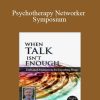
![[Audio Download] EP95 Clinical Demonstration 16 - Working with the Body in Analytic Therapy - Alexander Lowen](https://imcourse.net/wp-content/uploads/2022/02/Audio-Only-EP95-Clinical-Demonstration-16-Working-with-the-Body-in-Analytic-Therapy-Alexander-Lowen-M.D.-100x100.png)
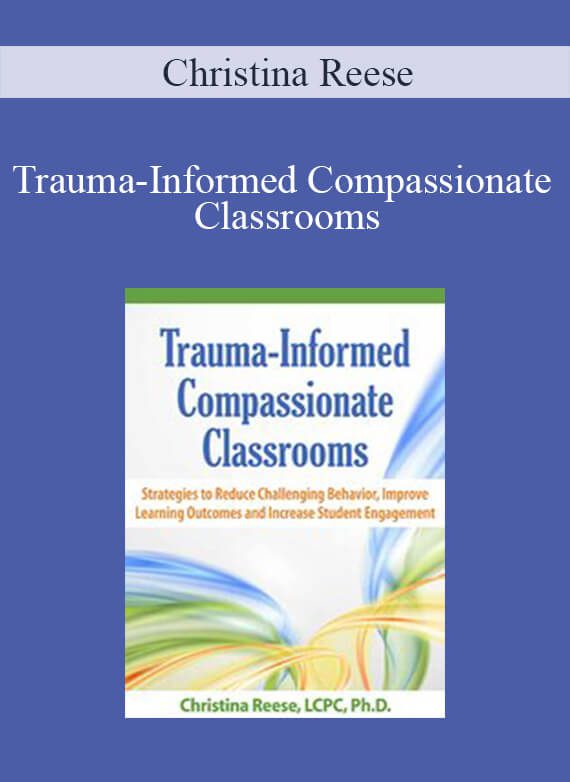

![[Download Now] Trauma and Attachment in Children and Families: Play](https://imcourse.net/wp-content/uploads/2022/02/Trauma-and-Attachment-in-Children-and-Families-Play-Art-and-CBT-to-Reduce-Symptomology-and-Repair-Connection-–-Christina-Reese.jpg)
![[Download Now] Trauma-Informed Compassionate Classrooms: Strategies to Reduce Challenging Behavior](https://imcourse.net/wp-content/uploads/2022/02/Trauma-Informed-Compassionate-Classrooms-Strategies-to-Reduce-Challenging-Behavior-Improve-Learning-Outcomes-and-Increase-Student-Engagement-–-Christina-Reese.jpg)
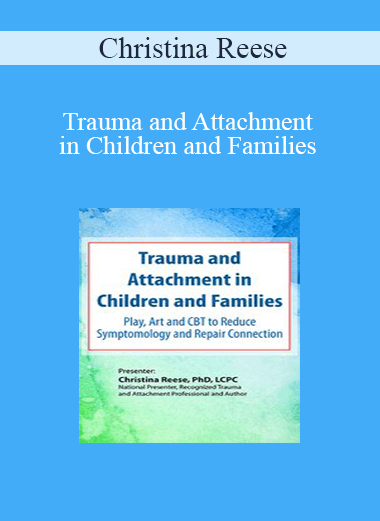
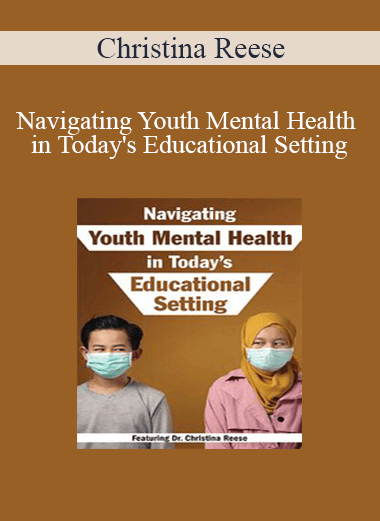
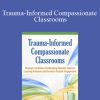
5 reviews for Christina Reese – Trauma-Informed Compassionate Classrooms: Strategies to Reduce Challenging Behavior, Improve Learning Outcomes and Increase Student Engagement
There are no reviews yet.